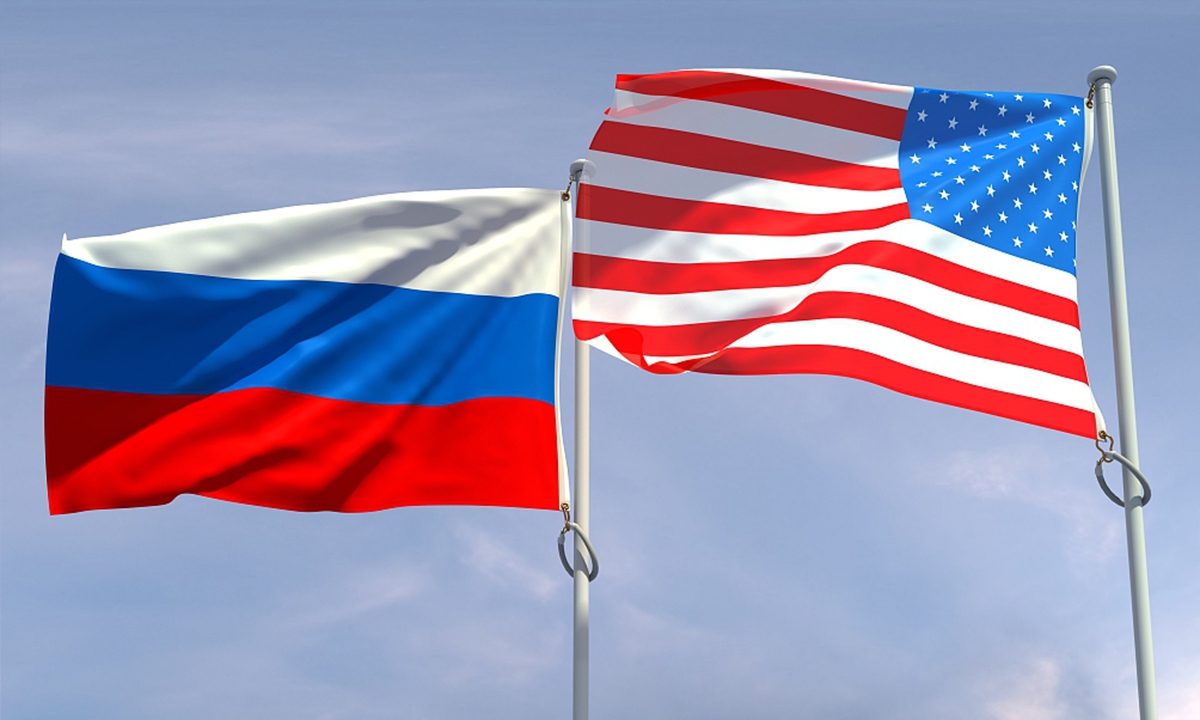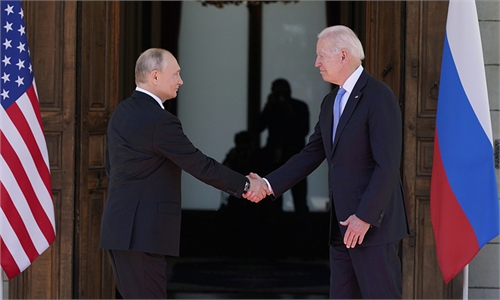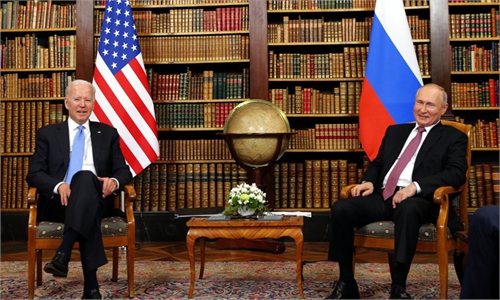
Russia and US Photo: VCG
Washington and Moscow held "professional and substantive talks" on strategic stability in Switzerland on July 28. During the talks the US delegation discussed "policy priorities and the current security environment, national perceptions of threats to strategic stability, prospects for new nuclear arms control, and the format for future Strategic Stability Dialogue sessions," State Department Spokesperson Ned Price said.This is the first strategic stability dialogue between Washington and Moscow since the two heads of state issued The US-Russia Presidential Joint Statement on Strategic Stability in June. It has many new features that need to be analyzed.
First, it is a strategic "stability" dialogue this time, not a strategic "security" dialogue as it was before. The two concepts - strategic stability and strategic security -may look similar, but they reflect different ideas in terms of arms control.
Strategic stability is the core concept of the US-Soviet/Russian arms control measures. It included the stability of arms race and crisis. Bilateral nuclear arms control treaties such as the Strategic Arms Reduction Treaty, the Intermediate-Range Nuclear Forces Treaty and the Anti-Ballistic Missile Treaty between the US and Russia all follow the basic principle of maintaining strategic stability.
The US-Russia Presidential Joint Statement on Strategic Stability noted that the US and Russia have demonstrated that, even during periods of tensions, they are able to make progress on shared goals of ensuring predictability in the strategic sphere. They can also commit to reducing risks of armed conflicts and threats of a nuclear war.
The strategic stability dialogue is the first step in implementing the above-mentioned commitment. However, questions remain of how to best combine concepts of strategic stability with the new international security situation. In this respect, Washington and Moscow are crossing the river by feeling the stones without mature theoretical thinking and a clear path forward.
Second, the dialogue this time is a "comprehensive" strategic stability dialogue. It is not a nuclear strategic stability dialogue limited to nuclear missile weapons. Over the past five decades, the US and Soviet/Russian leaders have used a progression of bilateral agreements and other measures to limit and reduce their substantial nuclear warheads and strategic missile and bomber arsenals. But with the development of new types of combat forces such artificial intelligence and hypersonic weapons, factors affecting strategic stability are increasing. Both Washington and Moscow are interested in expanding the context of the strategic stability dialogue.
Third, the strategic stability talks are not arms control negotiations. The US-Russia Presidential Joint Statement on Strategic Stability issued in June clearly stated that the aim of the Strategic Stability Dialogue is to "seek to lay the groundwork for future arms control and risk reduction measures." This dialogue, based on previous dialogues between deputy foreign ministers from the US and Russia, is different from their perfunctory strategic security dialogue that was held during the Trump administration. Instead, it aims to create conditions to reach a consensus for new arms control measures.
The two sides agreed to hold another Strategic Stability Dialogue in September. Before that, Washington and Moscow will, through informal negotiations, determine the agenda to be discussed. Given that the Biden administration has not yet completed the nuclear posture review, and has not had a fully clear picture of its need for the structure and scale of its nuclear force, it is difficult for the two sides to embark on substantive negotiations this year, let alone achieve any substantive results on arms control.
The Strategic Stability Dialogue between Washington and Moscow could help maintain bilateral arms control regimes. It will also help slow down the pace of arms race, which is of significance to international security. But it will not be easy for the US and Russia to reach a further arms control agreement. Why? Because Washington and Moscow have evident divergences over a series of pivotal issues.
Furthermore, it is worth noting that when promoting US-Russia Strategic Stability Dialogue, the Biden administration has been sensationalizing, with groundless excuses, the so-called China's expansion of nuclear power. This is obviously being done in a bid to pile pressure on China's arms control. It further aims to sow discord in the strategic partnership or coordination efforts being conducted between Beijing and Moscow.
Similarly, Washington has repeatedly tried to draw Beijing's attention to Moscow's efforts to modernize its strategic forces during talks between the US and China This is Washington's old trick in the great power competition - one that is hard to achieve its expected effects.
The author is director of Arms Control Studies Center, China Institutes of Contemporary International Relations. opinion@globaltimes.com.cn


